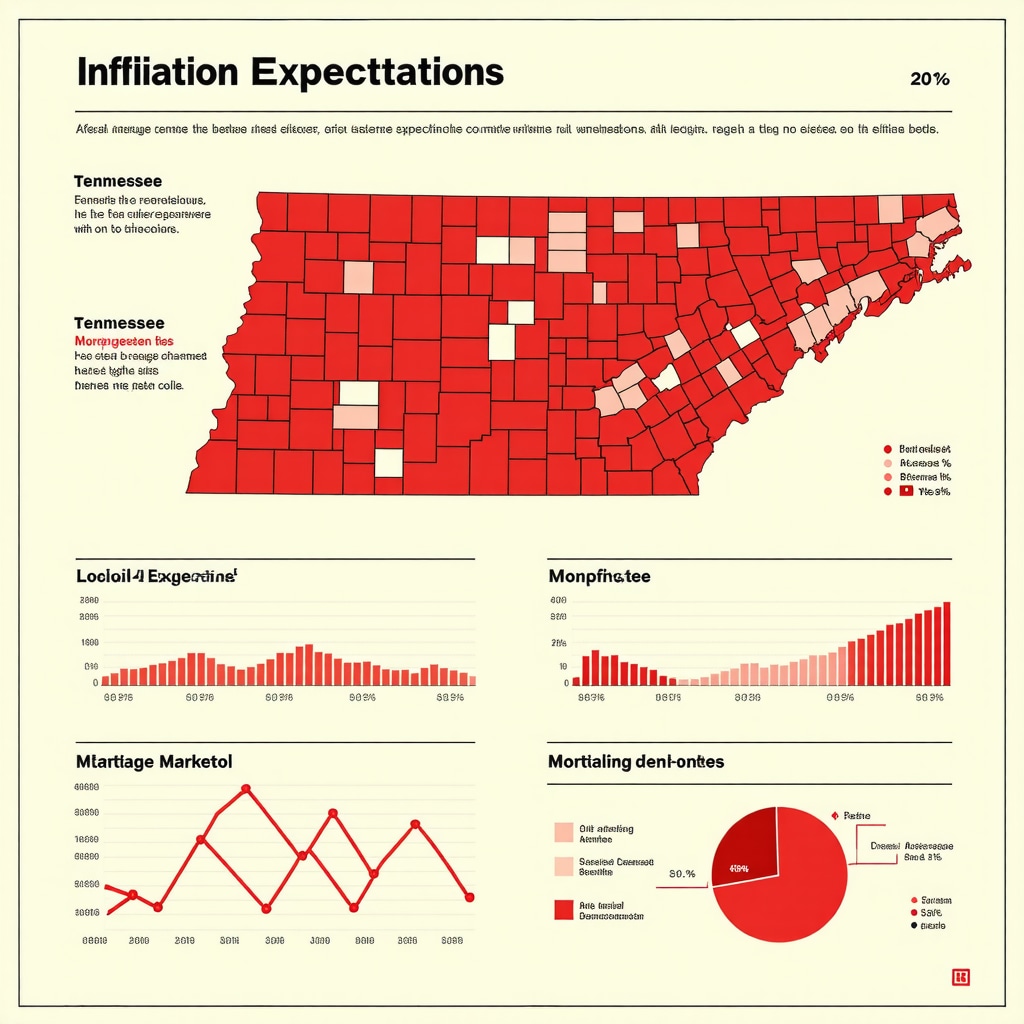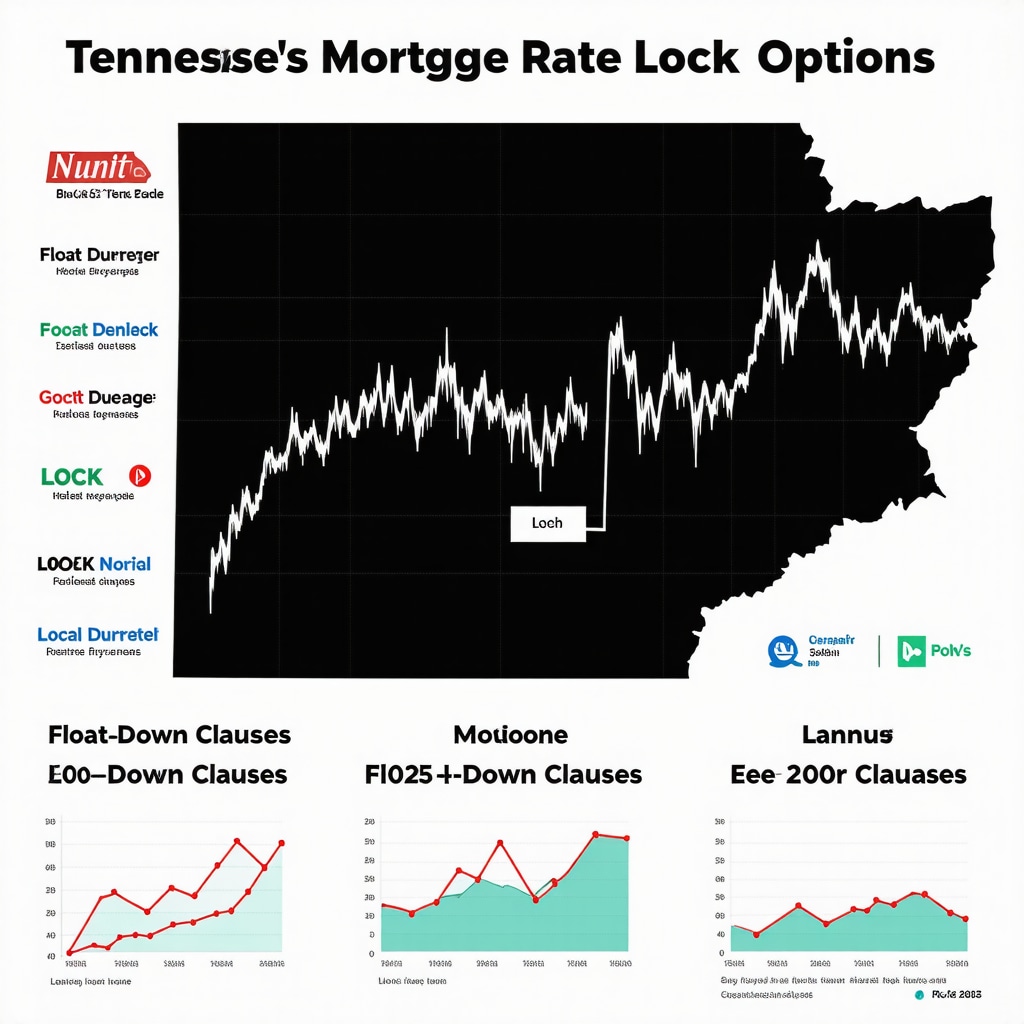Why Are Tennessee Mortgage Rates Playing Hard to Get in 2025?
Picture this: You’re sitting at a cozy Nashville coffee shop, sipping your favorite brew, and scrolling through mortgage rates on your phone. Rates are dancing up and down like a Tennessee two-step, leaving you wondering, “What on earth is driving these mortgage rate swings in my home state?” Well, buckle up—this is your front-row seat to the 2025 Tennessee mortgage rate rollercoaster.
When Local Flavor Meets Global Economics: The Rate Recipe
Mortgage rates in Tennessee aren’t just numbers conjured out of thin air. They’re a cocktail of nationwide economic forces spiked with local market zest. Federal Reserve policies, inflation expectations, and U.S. Treasury yields set the baseline. But here’s where Tennessee adds its own spice: regional housing demand, local employment trends, and state-specific lending regulations all stir the pot.
Take, for instance, the recent surge in Nashville’s real estate market. As more folks flock to Music City’s booming job scene, lenders respond by adjusting rates to balance risk and demand. This local dynamic intertwines intricately with national economic signals, making Tennessee mortgage rates uniquely nuanced. Curious about how these factors mesh? Check out this deep dive into how mortgage rates are determined in Tennessee.
Are Your Credit Scores Really the MVPs of Mortgage Rates?
Absolutely. Your credit score isn’t just a number; it’s your mortgage rate’s best friend or worst enemy. Lenders in Tennessee meticulously analyze your creditworthiness to decide how much interest you’ll pay. A higher score can unlock lower rates, potentially saving you thousands over your loan term. Want to polish that credit score and trim your mortgage costs? Dive into expert tips on how credit scores shape your mortgage interest rates today.
The Tennessee Twist: Government Programs and Their Impact
Don’t overlook government-backed loans, such as FHA or VA programs, which often offer competitive rates in Tennessee. These options are not just for first-time buyers or veterans; they’re strategic tools that can influence overall market rates by shifting borrower profiles and lending risks. For a primer on how these programs shape the landscape, see the inside scoop on Tennessee’s FHA loan rates.
As you navigate this complex terrain, remember that mortgage rates are also affected by the timing of your loan application, the type of mortgage product you choose, and even the lender’s appetite for risk. Staying informed and proactive is your best bet.
Ready to Beat the Rate Game?
If this dance of numbers and factors has you thinking about your next move, why not join the conversation? Share your thoughts, experiences, or questions in the comments below—because understanding Tennessee mortgage rates in 2025 is a journey best taken together. And for those ready to take action, learning how to shop mortgage rates in Tennessee might just be your secret weapon.
For those craving a data-backed perspective, the Federal Reserve’s monetary policy updates provide invaluable clues on national influences shaping your local mortgage rate landscape.
How Does Tennessee’s Housing Market Influence Mortgage Rates Beyond the Basics?
While national economic indicators set the stage, Tennessee’s housing market dynamics add layers of complexity to mortgage rates. For example, urban centers like Nashville and Memphis experience rapid population growth and heightened demand, often pushing rates and home prices upward. Conversely, rural areas might see slower rate changes due to less volatile demand. Understanding these local market rhythms can empower buyers to time their mortgage applications strategically.
Moreover, Tennessee’s housing inventory levels directly affect lender risk assessments. A tighter inventory means more competition among buyers, which can translate into lenders adjusting rates to capitalize on demand or mitigate risk exposure. This delicate balance underscores why mortgage rates can vary not only across states but even between cities and neighborhoods within Tennessee.
What Are the Hidden Costs and Benefits of Locking in Your Mortgage Rate Early in Tennessee?
Locking in a mortgage rate can seem like a straightforward decision, but in Tennessee’s fluctuating 2025 market, it’s anything but. Early rate locks might protect against rising rates but could also mean missing out if rates dip. Additionally, some lenders charge fees or limit flexibility when you lock early. Evaluating these trade-offs requires a nuanced approach tailored to your financial situation and Tennessee’s market forecasts.
Experts recommend staying informed through frequent updates and consulting local mortgage brokers who understand Tennessee’s unique market nuances. They can provide personalized advice on when to lock rates to maximize savings and minimize risk. For a comprehensive guide on this topic, explore our resource on locking in your Tennessee mortgage rate in 2025.
Additionally, your choice between fixed and adjustable mortgage rates plays a critical role here. Fixed rates offer stability, while adjustable rates might provide short-term savings but carry risk if rates climb. Tennessee buyers can benefit from weighing these options carefully, as discussed in our expert guide on fixed vs. adjustable mortgage rates.
The Role of Tennessee Mortgage Brokers: Local Expertise in a Complex Market
Mortgage brokers in Tennessee serve as invaluable guides amid the state’s complex lending landscape. Their deep knowledge of local lenders, rate trends, and borrower profiles enables them to secure competitive rates and loan terms that might not be accessible through direct lending channels.
Working with a trusted broker can also streamline the application process, help identify suitable loan programs—including government-backed options—and provide tailored advice that aligns with your homeownership goals. To find the best match, consider our detailed advice on choosing the best mortgage broker in Tennessee.
How Can Tennessee Homebuyers Leverage Economic Forecasts to Anticipate Mortgage Rate Trends?
Predicting mortgage rates is notoriously challenging, yet understanding economic forecasts can offer strategic insights. According to recent analyses from the Federal Reserve Economic Data (FRED) database, factors such as anticipated inflation rates, employment trends, and Federal Reserve policy adjustments provide early signals about possible rate movements.
For Tennessee buyers, aligning mortgage planning with these macroeconomic indicators—while factoring in local market conditions—can optimize timing and loan structuring decisions. Staying updated with authoritative sources like the Federal Reserve Economic Data (FRED) ensures you base your decisions on credible, current information.
Have you experienced challenges or successes navigating Tennessee’s mortgage rate fluctuations? Share your insights or questions below to enrich our community’s understanding and help fellow homebuyers make informed decisions.
Decoding the Intricacies of Mortgage Rate Volatility: An Expert’s Guide to Tennessee’s 2025 Market
Mortgage rates in Tennessee are not merely the product of isolated variables; they are the culmination of a dynamic interplay between macroeconomic forces and hyper-localized market behaviors. To truly master the art of securing favorable mortgage rates this year, one must peer behind the curtain of headline numbers and dig into the nuanced mechanisms at work.
For instance, the Federal Reserve’s interest rate decisions set broad parameters, but how lenders interpret these signals in Tennessee depends heavily on localized credit risk assessments and borrower demand elasticity. This creates pockets of rate variability even within the same metro area, a complexity often overlooked by casual buyers.
How Do Tennessee’s Diverse Economic Sectors Influence Mortgage Lender Risk Calculations?
Tennessee’s economy is a mosaic of diverse sectors, from manufacturing hubs in Chattanooga to the tech and healthcare boom in Nashville. These sectoral strengths and vulnerabilities directly affect employment stability, which lenders analyze to gauge borrower reliability. A robust job market in a particular sector can lead lenders to offer more competitive rates to borrowers employed therein, recognizing lower default risk.
Conversely, areas experiencing sectoral downturns may see lenders tightening credit standards and increasing rates to offset perceived risks. This interconnectedness underscores why savvy mortgage shoppers in Tennessee benefit from understanding not just their personal finance profile, but also the economic health of their employment sector.
Moreover, regional economic forecasts, such as those from the Bureau of Labor Statistics Tennessee economic data, offer invaluable signals for anticipating shifts in mortgage rate availability and terms.
Harnessing Mortgage Rate Lock Strategies: Timing and Flexibility in a Fluctuating Market
While locking in a mortgage rate can provide certainty, doing so without a strategic framework may lead to missed opportunities or unnecessary costs. Expert mortgage brokers in Tennessee recommend a tiered approach: initiating a preliminary rate lock when market indicators suggest upward pressure, but maintaining flexibility to renegotiate if rates fall within a defined window.
This strategy often involves negotiating with lenders for a “float-down” option, allowing borrowers to benefit from rate decreases after locking in. While not universally available, such provisions can be a game-changer in Tennessee’s 2025 mortgage landscape.
Additionally, understanding lender-specific rate lock policies—including duration limits and associated fees—is critical. Some lenders offer longer lock periods at premium costs, which might be justified for buyers facing extended closing timelines. Balancing these factors requires detailed consultation with seasoned brokers who possess intimate knowledge of Tennessee’s lender ecosystem.
What Are the Advanced Risk Metrics Lenders Use to Adjust Mortgage Rates in Tennessee?
Beyond credit scores and employment, lenders increasingly incorporate sophisticated risk metrics such as debt-to-income ratios adjusted for cost-of-living variations, property location risk assessments, and borrower liquidity analyses. For example, a borrower with substantial liquid assets may qualify for lower rates despite moderate credit scores, as liquidity reduces default likelihood.
Furthermore, lenders utilize predictive analytics to model local market volatility, factoring in potential environmental risks or economic disruptions. Tennessee-specific considerations, such as flood zone designations or proximity to economic development zones, can subtly influence rate offers.
Understanding these advanced underwriting criteria empowers borrowers to optimize their mortgage applications by highlighting strengths lenders value most.
Exploring the Impact of Inflation Expectations on Tennessee Mortgage Rate Forecasts
Inflation expectations play a pivotal role in shaping mortgage rates nationwide, and Tennessee is no exception. As investors demand higher yields to offset anticipated inflation, mortgage rates tend to rise. However, the state’s unique cost structures—like energy prices and housing supply constraints—modulate how inflation perceptions translate into actual rate movements locally.
For homebuyers and refinancers, tracking inflation-linked bond yields, such as Treasury Inflation-Protected Securities (TIPS), can offer early warnings of rate shifts. This is complemented by monitoring the 10-Year Breakeven Inflation Rate, a key indicator from the Federal Reserve Economic Data (FRED) database.

Staying attuned to these inflation signals alongside Tennessee’s housing market trends equips buyers to make more informed decisions about locking rates or opting for adjustable-rate mortgages.
How Can Borrowers Leverage Adjustable-Rate Mortgages (ARMs) Amid Tennessee’s Economic Fluctuations?
Adjustable-rate mortgages offer a nuanced risk-reward profile, particularly in Tennessee’s variable market. Borrowers anticipating short-term residence or expecting declining rates might benefit from the initial lower payments ARMs provide. However, prudent evaluation of adjustment intervals, caps, and index benchmarks is essential to avoid future payment shocks.
Expert advice suggests pairing ARM decisions with rigorous scenario planning and sensitivity analyses, ideally with professional guidance. This helps quantify potential payment trajectories under varying economic conditions, ensuring borrowers can comfortably manage rate adjustments.
For a deeper dive into structuring ARM products tailored to Tennessee’s 2025 environment, visit our detailed guide on advanced ARM strategies for Tennessee homebuyers.
Ready to elevate your mortgage strategy? Engage with local experts and leverage these advanced insights to navigate Tennessee’s mortgage rate maze with confidence. Your best rate awaits—but only if you’re equipped to claim it.
Unlocking the Power of Rate Lock Flexibility: How to Navigate Tennessee’s Shifting Mortgage Landscape
In Tennessee’s dynamic 2025 mortgage market, locking in a rate early can be both a shield and a gamble. Savvy borrowers are increasingly eyeing flexible rate lock options, such as float-down clauses, which permit a rate reduction if market rates dip after locking. While not all lenders offer this, those who do provide Tennessee buyers a strategic advantage amid unpredictable rate swings.
Understanding the nuances of these options is crucial. For instance, float-down periods might be limited to a few weeks, and associated fees can vary. Collaborating with experienced local brokers, who intimately understand lender policies, can unlock these valuable provisions and help tailor a locking strategy that balances security with opportunity. For a detailed roadmap, check out our step-by-step guide to locking in your Tennessee mortgage rate in 2025.
How Are Tennessee’s Emerging Tech and Healthcare Sectors Reshaping Mortgage Risk Profiles?
Tennessee’s robust growth in technology and healthcare sectors—particularly in hubs like Nashville and Memphis—has profound implications for mortgage lenders’ risk models. Employment stability in these fields often signals lower default risk, prompting lenders to offer more competitive interest rates to borrowers employed therein.
However, this also introduces a nuanced challenge: lenders might weigh borrower occupation more heavily, subtly shaping rate offers based on sectoral economic forecasts. The Bureau of Labor Statistics Tennessee economic data highlights this sectoral growth, offering homebuyers and brokers a valuable lens to anticipate how employment trends could influence mortgage terms locally.
When Fixed Meets Adjustable: Crafting Personalized Mortgage Strategies in Tennessee’s 2025 Market
Choosing between fixed and adjustable-rate mortgages is no longer a binary decision for Tennessee homebuyers. Many are adopting hybrid approaches—beginning with adjustable rates to capitalize on lower initial payments and then refinancing or switching to fixed rates as market conditions evolve.
This tactical flexibility demands a sophisticated understanding of rate forecasts, personal financial trajectories, and local market idiosyncrasies. Our comprehensive expert guide on navigating fixed vs adjustable mortgage rates provides invaluable insights to tailor your approach to Tennessee’s evolving lending environment.
Ready to deepen your engagement with Tennessee’s mortgage rate landscape? Share your experiences or questions in the comments below or connect directly with our local specialists via our contact page. The smartest mortgage decisions come from informed conversations and expert guidance.

Expert Insights & Advanced Considerations
The Nuanced Impact of Sector-Specific Employment on Mortgage Risk
Understanding Tennessee’s multifaceted economy reveals how sectoral employment trends—especially in tech, healthcare, and manufacturing—significantly sway mortgage lender risk assessments. Borrowers in thriving sectors often benefit from more favorable rates due to perceived job stability, underscoring the importance of factoring in economic health beyond personal credit metrics. For deeper context, explore the Bureau of Labor Statistics Tennessee economic data.
Strategic Rate Locking with Flexibility to Navigate Volatility
In 2025’s fluctuating Tennessee market, incorporating float-down options within mortgage rate locks can balance protection against rising rates with the agility to capitalize on declines. Collaborating with local brokers familiar with lender-specific policies enhances the ability to negotiate such provisions, optimizing cost savings and timing. Our detailed step-by-step guide to locking in your Tennessee mortgage rate offers valuable tactics.
Advanced Risk Metrics Shape Personalized Mortgage Offers
Lenders increasingly apply sophisticated models incorporating debt-to-income ratios adjusted for Tennessee’s cost of living, property location risks, and borrower liquidity. Recognizing these factors allows borrowers to highlight their financial strengths strategically and potentially secure lower rates despite average credit scores. For further exploration, see insights on credit score impacts and improving credit to save more.
Balancing Fixed and Adjustable Mortgage Rates for Optimal Outcomes
The dynamic interplay between fixed and adjustable rates in Tennessee’s 2025 environment calls for hybrid strategies tailored to individual plans and market forecasts. Borrowers leveraging initial adjustable rates with planned refinancing can benefit from lower early payments without long-term rate exposure. Our expert guide on fixed vs adjustable mortgage rates provides comprehensive comparisons and scenario analyses.
Curated Expert Resources
- Federal Reserve Economic Data (FRED): An indispensable source offering real-time inflation, interest rate, and economic forecasts crucial for anticipating mortgage rate shifts nationally and regionally. Explore FRED.
- Bureau of Labor Statistics Tennessee Economic Data: Detailed analytics on employment trends by sector across Tennessee, helping buyers and lenders gauge job market stability. Access BLS Tennessee data.
- Tennessee Mortgage Rate Lock Strategies Guide: A practical walkthrough on timing and flexibility for locking mortgage rates effectively amid market volatility. Found at our comprehensive guide.
- Credit Score Influence on Tennessee Mortgage Rates: Offers insight into credit score optimization to achieve lower mortgage interest rates, enhancing borrower negotiation power. See this resource.
- Fixed vs Adjustable Mortgage Rates Expert Guide: An essential resource for crafting mortgage strategies tailored to Tennessee’s unique market dynamics in 2025. Visit the guide.
Final Expert Perspective
Decoding Tennessee mortgage rates in 2025 demands a layered approach that fuses macroeconomic understanding with local market intelligence. The interplay between sector-specific employment trends, advanced lender risk metrics, and strategic rate locking defines the landscape. Borrowers equipped with deep knowledge and expert guidance navigate this intricate environment to secure optimal financing terms. Engage actively with local mortgage brokers and leverage authoritative resources to transform market complexity into opportunity. Ready to sharpen your strategy or share your expertise? Connect with seasoned professionals via our contact page and continue the conversation that empowers smarter mortgage decisions in Tennessee’s dynamic 2025 market.

